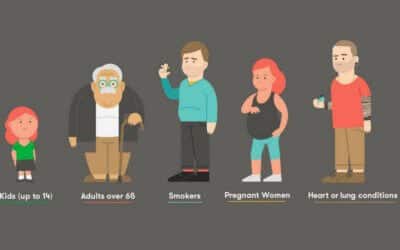Cancer and Food

Eating a wide variety of foods from each of the five food groups, in the amounts recommended helps maintain a healthy and interesting diet and provides a range of different nutrients to the body. Eating a variety of foods promotes good health and can help reduce the risk of disease.
The five food groups are:
- fruit
- vegetables and legumes/beans
- lean meats and poultry, fish, eggs, tofu, nuts and seeds, legumes/beans
- grain (cereal) foods, mostly wholegrain and/or high cereal fibre varieties
- milk, yoghurt, cheese and alternatives, mostly reduced fat.
Foods are grouped together because they provide similar amounts of key nutrients. For example, key nutrients of the milk, yoghurt, cheese and alternatives group include calcium and protein. These food groups make up the Australian Guide to Healthy Eating.
Diet is just one of the lifestyle factors that influence the risk of developing cancer. Smoking, obesity, alcohol, sun exposure and physical activity levels are also important. Although some foods can affect cancer risk, there is no evidence that specific foods can cause or cure cancer.
Grains help to protect against cancer
Eating seven or more serves daily of a variety of grains, grain products, legumes, roots and tubers will also provide protective benefits against cancer. The less processed the grains, the better, so try to aim for wholegrain foods. Oats, brown rice, corn, rye, kidney beans and lentils are all good foods to consume. Diets high in refined starch and refined sugar may increase the risk of stomach cancer and bowel cancer.
Meat and bowel cancer
There is now convincing scientific evidence that eating processed meat increases bowel cancer risk. The World Cancer Research Fund (WCRF) has recently recommended that people avoid eating processed meat. Processed meats include any meat that has been preserved by curing, salting or smoking, or by adding chemical preservatives. These include hot dogs, ham, bacon, and some sausages and burgers.
It is recommended that children are not given processed meats. This is because many of the habits we develop as children last into adulthood. Substitutes for processed meats that are recommended for children include fish or lean poultry, lean meats or low-fat cheese.
There is convincing evidence that red meat also increases a person’s risk of bowel cancer. It is recommended that individuals, particularly men, decrease their intake of red meat. The WCRF recommends limiting the amount of fresh red meat we eat to less than 500 g of cooked (or 700 g uncooked) red meat a week. Some research suggests that eating burnt or charred meat may increase cancer risk, but the evidence is unclear.The Australian Guide to Healthy Eating recommends consuming a range of variety of foods from the food group ‘lean meats and poultry, fish, eggs, tofu, nuts and seeds and legumes and beans.’
Fats and cancer
There has been a great deal of interest in a possible link between fat and cancer. Current evidence does not indicate a direct link between fat intake and particular types of cancer (with the possible exception of prostate cancer). However, a high-fat diet may lead to obesity, which is a risk factor for several cancers, including cancers of the colon, breast, kidney, oesophagus, gallbladder and endometrium.
Fruits, vegetables and cancer
Eating fruit and vegetables has long been known to provide many health benefits. Fruits and vegetables contain many vitamins, minerals and antioxidants, which may help to decrease your risk of cancer in particular areas of the digestive system, such as the mouth and stomach.
Evidence has weakened over recent years over the role of fruit and vegetables in preventing cancer. Yet fruits and vegetables are still an important part of your diet and may play an indirect effect of preventing cancer because they are relatively low in kilojoules (energy) and consumption is associated with a healthier weight.
Common cancers and food
Some common cancers may be affected by what we eat, such as lung cancer, breast cancer, prostate cancer and bowel cancer.
Lung cancer
Lung cancer is the leading cause of death from cancer in the world, and most lung cancers are caused by smoking.
Eating a healthy diet with lots of fruit and vegetables has been linked to a lower risk of lung cancer, both in people who smoke and those who do not. Recent evidence suggests that cruciferous vegetables such as cabbage, cauliflower, broccoli and bok choy are excellent vegetable choices.
While eating fruits and vegetables may offer some degree of protection from lung cancer, not smoking (and avoiding second-hand smoke) is by far the best prevention.
Breast cancer
Breast cancer is the most common type of cancer among women in the world. There is an increased risk of breast cancer with factors such as rapid early growth, greater adult height and weight gain in adulthood.
Much of the risk of developing breast cancer involves factors that influence oestrogen levels during a woman’s reproductive life, such as age of menarche (first period), late menopause, number of pregnancies, having the first pregnancy late in life and breastfeeding practices.
The rate of breast cancer also increases with age. Postmenopausal women who are carrying too much weight, particularly around their middle, have more than twice the average risk of breast cancer. Diets high in foods containing mono-unsaturated fat, such as olive oil, canola oil, some nuts and seeds, and high in vegetables may reduce the risk. High alcohol consumption may increase the risk of breast cancer.
Prostate cancer
Prostate cancer is the most common cancer in Australian men. Men over the age of 50 are at greater risk. However, it can be seen in younger men as well. Vegetables (soy, in particular) may decrease the risk, while a high-fat diet that comprises mostly of animal fat sources (such as dairy products, fatty meats and takeaway foods) may increase the risk. Maintaining a healthy body weight may reduce the risk of prostate cancer.
Lycopene is a potent antioxidant found in tomatoes, tomato-based products, watermelon and strawberries that may help lower the risk of prostate cancer. Evidence suggests that consuming one to two serves of tomatoes per day (where a serve is ½ a cup or 75 grams) is associated with reduced risk of prostate cancer.
Bowel cancer
Bowel cancer (colorectal cancer) is the second most common cause of cancer-related death in Australia. Up to 70 per cent of cases can be prevented by following a healthy lifestyle. Keeping a healthy weight, being physically active and having a diet high in vegetables and fibre are protective, while consuming a large amount of red meat, processed meat and alcohol may increase the risk.
Protecting against cancer – foods and drinks to limit
Foods and drinks to limit in your diet or have less of include:
- fatty red meats and processed meats
- highly processed foods that are low in fibre
- heavily salted and pickled foods
- alcohol.
Protecting against cancer – foods to ‘eat more of’
The strongest protective anti-cancer effect has been shown with:
- vegetables, especially raw vegetables or salads, such as leafy green
- vegetables and carrots
- foods high in dietary fibre, such as grains and cereals
- tomatoes
- citrus fruits (such as oranges, grapefruit, lemons, limes)
- cruciferous vegetables like broccoli, cabbage, Brussels sprouts, bok choy and other Asian greens.
Include more of these vegetables and fruits in your diet, along with other varieties.
Supplements are not the answer to preventing cancer
The World Cancer Research Fund suggests high-dose dietary supplements are not recommended for cancer prevention, and the best approach to preventing cancer is to aim to meet nutrition needs through whole foods.
Studies may show that foods containing certain nutrients have a protective effect. However, this does not mean that these nutrients will provide the same benefits for cancer prevention if taken as supplements.
In some cases, there has been an increased risk of cancer in those people who take nutrient supplements at doses higher than the usual amount of that nutrient normally eaten in foods. For example, the use of beta-carotene and vitamin E supplements has not been proven to be effective in either prevention or treatment of lung cancer. In fact, several studies have shown that beta-carotene supplements actually increase the risk of lung cancer in people who smoke.
Foods that may increase cancer risk
While a high-energy, low-fibre diet may increase a person’s risk of developing cancer, some individual foods have also been singled out as potentially causing cancer (carcinogenic). These include:
-
artificial sweeteners
– such as aspartame, saccharin and cyclamate. Laboratory rats can develop bladder cancer if fed huge amounts of saccharin or cyclamate, although this is at levels thousands of times greater than a normal diet. International studies have shown that humans are not affected in the same way. Artificial sweeteners are considered safe to eat
-
cured, pickled or salty foods
– bacon and other cured or pickled meats contain a substance called nitrate, which has the potential to cause cancer, and in particular bowel cancer, when eaten in large doses. To be on the safe side, it is best to limit the amount of cured meats in the diet, because they are also generally high in fat and salt. Salt has also been associated with an increased risk of stomach cancer and should be consumed in limited amounts
-
burnt or barbecued foods
– a group of carcinogenic substances called polycyclic aromatic hydrocarbons (PAHs) can be produced if foods are overheated or burnt. Although charred or smoked foods could contain traces of PAHs, experts agree that the amount in the average Australian diet is too low to be considered a significant cancer risk. However, when cooking, it’s best to use relatively low temperature methods wherever possible and limit your intake of char-grilled meats and foods. Low-temperature cooking methods include steaming, boiling, poaching, stewing, casseroling, braising, baking, microwaving and roasting
-
peanuts
– some laboratory animals can develop cancer after eating peanuts that are contaminated with toxin-producing moulds. However, peanuts sold in Australia are generally uncontaminated and contamination is routinely screened for
-
alcohol
– consuming alcohol increases the risk of cancers of the mouth, pharynx, larynx, oesophagus, breast, bowel and liver. The risk is even greater in people who smoke. Even small amounts of alcohol can increase your risk. To reduce their risk of disease, men should drink less than two standard drinks a day and women less than one standard drink a day.
Treating cancer with food
While food plays an important role in preventing some cancers, the therapeutic value of food in treating existing cancer is less clear. It is true that a person with cancer needs excellent nutrition in order to better cope with the physical demands of the illness and the rigours of medical treatment.
Claims that particular foods, vitamins or micronutrients can kill cancer cells should be viewed with scepticism. To date, there is little scientific proof that a particular food or supplement can cure cancer or destroy cancer cells.
Nutrition for the person with cancer is important for many reasons, including:
The immune system needs bolstering to fight at full strength.
The diet may be adjusted to cope with various symptoms, such as constipation, diarrhoea or nausea.
Loss of appetite or an increased metabolism means that high-energy foods may need to be included in the daily diet.
Extra protein may be needed to help prevent loss of muscle from weight loss.
To read the original article, click here
DISCLAIMER:
The content has been made available for informational and educational purposes only. Central Coast Orthodontics does not make any representation or warranties with respect to the accuracy, applicability, fitness, or completeness of the content.
The content is not intended to be a substitute for professional personal diagnosis or treatment. Always seek the advice of your dentist or another qualified health provider with any questions you may have regarding a dental or medical condition. Never disregard professional advice or delay seeking it because of something you have read or seen on the Site.
Related Articles
Metal Braces: Does This Traditional Dental Technology Have a Future?
Of all the medical professions, dentistry has always generated the most fear and continues to; despite the phenomenal advances that give painless precision to the human story of solving the medical and practical problems of teeth. The evolution of...
Braces Tightening: Frequency, Purpose and Side-Effects
A straight and stunning smile – it’s the dream, isn’t it? And with braces fitted by a specialized orthodontist, it’s a dream that’s well wi…
Air Pollution
Pollutants in the air are caused by natural events (such as bushfires, windstorms and pollen) or human activities (including industrial processes…




